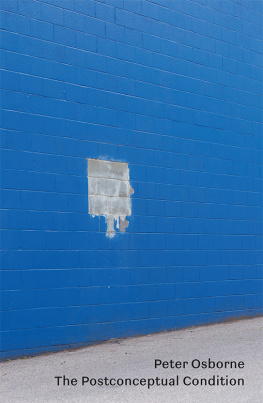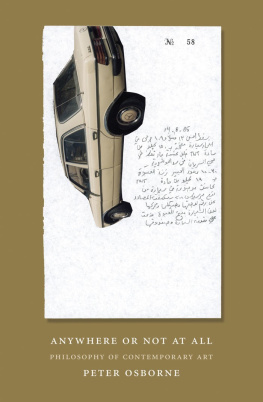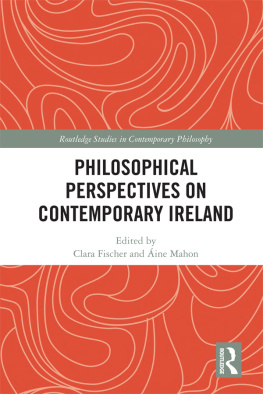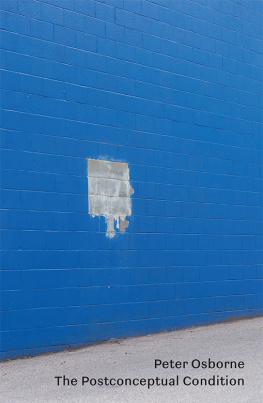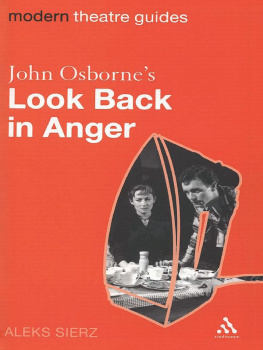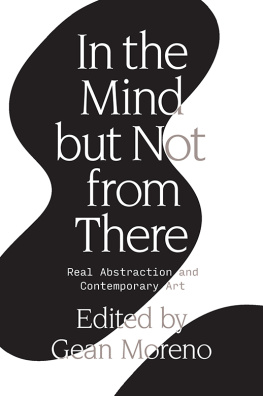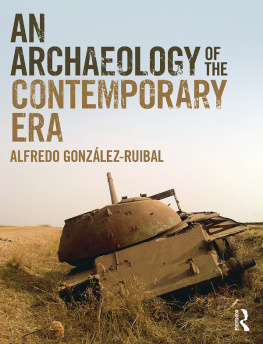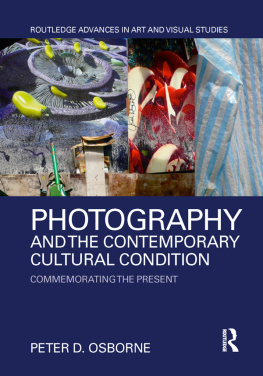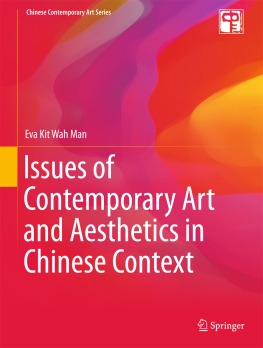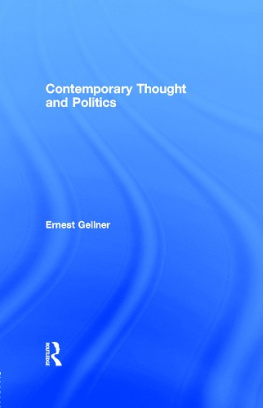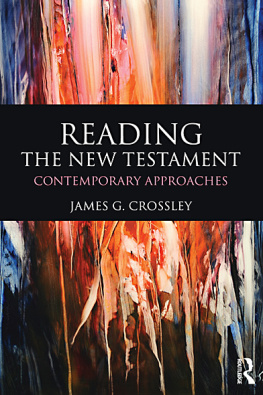The Postconceptual Condition
Critical Essays
Peter Osborne

First published by Verso 2018
Peter Osborne 2018
All rights reserved
The moral rights of the author have been asserted
1 3 5 7 9 10 8 6 4 2
Verso
UK: 6 Meard Street, London W1F 0EG
US: 20 Jay Street, Suite 1010, Brooklyn, NY 11201
versobooks.com
Verso is the imprint of New Left Books
ISBN-13: 978-1-78663-420-7
ISBN-13: 978-1-78663-490-0 (LIBRARY)
ISBN-13: 978-1-78663-422-1 (US EBK)
ISBN-13: 978-1-78663-421-4 (UK EBK)
British Library Cataloguing in Publication Data
A catalogue record for this book is available from the British Library
Library of Congress Cataloging-in-Publication Data
Names: Osborne, Peter, 1958 author.
Title: The postconceptual condition : critical essays / Peter Osborne.
Description: Brooklyn : Verso, 2018.
Identifiers: LCCN 2017050552 | ISBN 9781786634207 (paperback)
Subjects: LCSH: Art, Modern 20th century Philosophy. | Art, Modern 21st century Philosophy. | Conceptual art. | BISAC: ART / Conceptual. | PHILOSOPHY / Criticism.
Classification: LCC N6490 .O7334 2018 | DDC 709.04/075 dc23
LC record available at https://lccn.loc.gov/2017050552
Typeset in Minion Pro by Hewer Text UK Ltd, Edinburgh
Printed by CPI Group (UK) Ltd, Croydon, CR0 4YY
For Stella
Contents
If as Walter Benjamin maintained, it is the function of artistic form to make historical content into a philosophical truth, as much as their immanent suspension of that passing character (in criticism, by writing) that places them into relation with such truth; relations that must thus be constantly renewed.
Today, it is the relations constituting the space of a global capitalist modernity, overdetermining other social relations with an insistent yet disjunctive and crisis-ridden contemporaneity, that must first be understood, as a condition of the renewal of a criticism that is to be at once both historical and emphatic (related to truth), and hence negative in relation to the world as it is. It is in the gap between the passing historical meaning and the truth of a work that the untruth of the present appears.
Contemporary art is a point of condensation of a vast array of social and historical forces, economic and political forms, and technologies of That is a process which, for all the intellectual materials available, scattered across the disciplines, has hardly begun. At the level of criticism, however, one can exploit particular instances and occasions, in order to render the contingent emblematic, a part of the whole, through the more concrete conceptualizations associated with the essay form. This is what I try to do here, in different ways, and at different levels of abstraction, in essays that are very much a part of the afterlife of this books precursor, Anywhere or Not At All: Philosophy of Contemporary Art.
These essays are located at that imaginary crossroads where the discourse of the university meets the speech of the artworld in the hope that the former might acquire greater actuality, while the latter may find a more lasting, critical and theoretical form. All but the first two, more theoretically wide-ranging, essays were initially written for talks at art institutions or as essays for art journals, in Belgium, Brazil, France, Germany, Russia, Spain and Sweden. They aspire to keep open a critical space within the transnationally proliferating discourses of contemporary art: a space that is summed up here by the terminologically difficult idea of a postconceptual condition, which is expounded in
The essays move from philosophical debates about the Time of the , for example, charts a single argumentative development, at different levels. In each chapter throughout the book, it is what Hegel called the whole that is the ultimate, determining object of the analyses, yet the whole necessarily appears in each instance only negatively, via different levels of abstraction and mediation.
The texts have been revised to remove a few purely occasional remarks, along with some recapitulations of theoretical content. However, thematic overlaps have been retained, and in some cases developed farther, to maintain that rhythm of allusion and variation characteristic of the essay form; indeed, of form as such. As for the judgements that are inevitably bound up with such analyses: as Lukcs famously remarked, the value-determining thing about judgement is not the verdict but the process of judging. Which does not mean that the verdict is otiose.
London, February 2017
Those with long enough memories will no doubt recognize the crossed syntax of my title. It mimics, first, a text that, while in historical terms still recent, is nonetheless already antiquated, though perhaps not yet sufficiently to have acquired those revolutionary energies that Andr Breton (and after him, Walter Benjamin) sought in such objects: Jean-Franois Lyotards The Postmodern Condition: A Report on Knowledge. It is approaching forty years since the first publication of that seemingly neutral review of a vast body of material on contemporary science and problems of knowledge or information, which proved to be (in Fredric Jamesons phrase) a kind of crossroads.
Periodizing Capitalism (Contra Jameson)
How very late, it now seems, still to have been periodizing capitalism as late in 1991, at the very moment of its most powerful renewal. In using the term late capitalism, Jameson was in part alluding to Adornos use of it, best known from his 1968 address to the Congress of German Sociology, Late Capitalism or Industrial Society? (Sptkapitalismus oder Industriegesellschaft?), where the emphasis falls more heavily on the retention of the concept of capitalism than on its internal periodization. In the meantime, Ernest Mandels 1972 Late Capitalism had provoked a broader revival of the term, originally coined by Werner Sombart as early as 1902 in his Modern Capitalism. It is important to remember that capitalism was first declared late quite so long ago although it was the 1916 edition of Sombarts book that was more influential in this respect, taking the onset of the First World War as its periodizing break between high capitalism (Hochkapitalismus) and late capitalism. Mandel would move that break forward again, to the end of the Second World War. By the late 1990s, struggling with the literature on globalization, Jameson would attempt to backdate globalization to 1945, in order to maintain periodizing consistency with Mandel. However, the effective logic of his discussion suggests that late capitalism should have been shifted forwards, yet again, in line with the emergence of the post-communist capitalist globalization that was gearing up in the late 1980s. To acknowledge this, though, would have
Jameson had called his 1990 book on Adorno Late Marxism, with perhaps more irony than he was aware. But then even as liberal a Marxist as Jrgen Habermas was comfortable using the term late capitalism in the 1970s, in the title of Legitimationprobleme im Sptkapitalismus (1973), for example a usage that was effaced by its translation into English three years later, in a manoeuvre presumably designed to avoid frightening the sociological horses, with which Habermass work was at that time being corralled.

